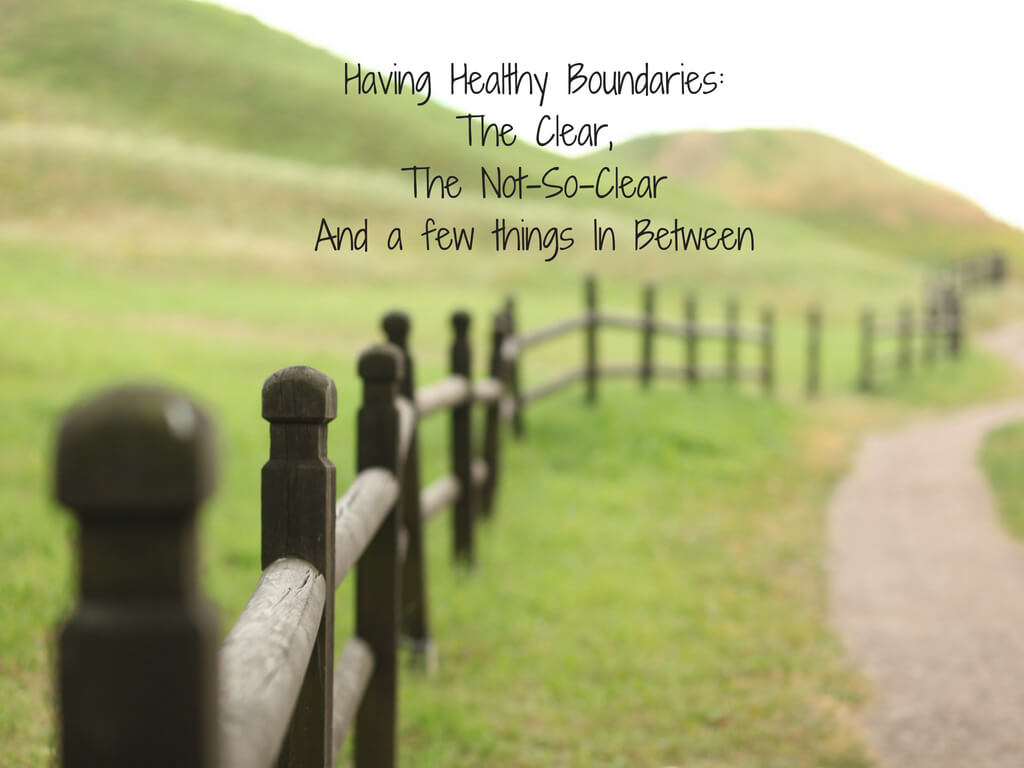Having Healthy Boundaries
Having Healthy Boundaries: The Clear, the Not-So Clear, and a Few Things In-Between
Have you ever found yourself completely exhausted trying to solve a problem for a friend? Or are you familiar with the feeling of frustration from a time you agreed to do something for someone because you couldn’t say no when you really would have preferred not to? Feeling taxed in these situations is the result of weak boundaries that can lead to resentment, anger, and more. So what style of boundary setting do you have?
Signs Your Boundaries May Be Too Weak:
- You have a hard time saying no
- You are overly dependent on what others think of you
- You don’t listen to your inner voice
- You take on too much responsibility for other people’s problems
- You change your identity to fit in with whomever you are around
- You don’t follow your heart in order to avoid conflict
- You tolerate being treated poorly or abused
Signs Your Boundaries May Be Too Rigid:
- You have cut off numerous meaningful people from your life
- You don’t listen to other people’s input and have created a wall around yourself
- You don’t care about other people’s problems
- You avoid getting too close to people
What Healthy Boundaries Look Like:
- Good self-esteem (not arrogance)
- Ability to share power in a relationship
- Honest and assertive
- Clear understanding of the difference between your feelings and needs and the feelings and needs of others
- Ability to share personal information gradually as trust builds in the relationship
Tips for Creating Healthy Boundaries
It is not uncommon to hear stories of weak boundaries and think that drawing the line and having healthy boundaries should be simple. Nevertheless, healthy boundaries can be more difficult to balance than they may look on the surface. So whether you err on the side of weak boundaries, or rigid boundaries or are pretty good at maintaining healthy boundaries, Here are some guidelines to keep in mind to help you identify how to bring yours (or keep yours) in a healthy state of balance:
1. Understand your values. Understanding what is important to you is the best place to start. This doesn’t mean that your values won’t change over time, but be aware of the changes as they occur.
2. Know your priorities. After establishing your values – identify their priority. What matters most to you? Not everything can be your number one priority, so how do they all rank? When you are deliberating over a difficult decision, reflect on your priorities as they can help you make decisions with integrity and confidence.
3. Respect yourself. Respecting yourself is about having a deep understanding of your self worth. It is about recognizing you are worthy of both giving and receiving love. It is about appreciating who you are and who you are not. It is about expecting the best for yourself and of yourself. It is not about expecting the best for yourself without having high expectations for your behavior. It is about expecting kind treatment while at the same time treating others with kindness.
4. You can only change you- not others. When we lack boundaries, we make efforts to change other people by taking on too much responsibility for them. By taking responsibility only for ourselves, yet having integrity and responsibility to others and our community, we are establishing healthy boundaries and living by action, not word.
5. Actions speak louder than words. When you set a boundary, it is less about stating the boundary than it is about showing the boundary. Likewise, when allowing or disallowing people to treat you a certain way, it is less about apologies from them than it is about changed behavior. I have too often seen people work to make amends through kind, genuine actions only to be snubbed due to a lack of formal apology. Be sure that your heart is in the right place and remember that no one is perfect.
6. Recognize that your boundaries may be different from others. Not all people’s boundaries look the same. Your friend may have different boundaries, as may your spouse. We all come into this world having different experiences, different values, different upbringings. We have gone through different struggles and have had different successes. All of these things impact our personalities, our values, and our goals. As a result, our boundaries all look slightly different and our interactions with friends and family have different meanings. Having good boundaries means that you should not impose yours on others nor allow others to be imposed on you.
7. Kindness counts- don’t be too rigid. Boundaries are important but need to be set with kindness at the core. When someone approaches you with a kind heart, it’s okay to welcome them. Don’t expect perfection from others, as you will never find that. Accept imperfection, as others accept imperfection in you. Know that people change and people grow. If you find you are eliminating your loved ones and isolating yourself, you may have boundaries that are too rigid. It is one thing to stop a behavior by expecting that you be treated with kindness and respect. It is another thing to not allow for mistakes, to not recognize your own mistakes, and to be unwilling to accept improved behavior from a loved one. When you do not accept a particular behavior, but yet do welcome kindness, you preserve the integrity of your boundaries and the purpose for which they were established.
There is Always More To Learn
Someone is rarely a master of boundaries, and as with everything else in life, imperfection reigns supreme. That said, continuing to work at it and recognizing the fine line necessary for balancing the many aspects of healthy boundaries is key. There are several good articles and books written on this topic. For more information, here are a few good resources and articles:
Boundaries Updated and Expanded Edition. When to say yes, how to say no to take control of your life. (2017) Cloud, H., Townsend, J.
Emotional Intelligence 2.0. (2009) Bradbury, T., Greaves, J.
The Difference Between Setting Boundaries and Shutting People Out. Hurban, H. https://tinybuddha.com/blog/difference-between-setting-boundaries-and-shutting-people-out/
Tamra Hughes, MA, LPC www.greenwoodcounselingcenter.com





